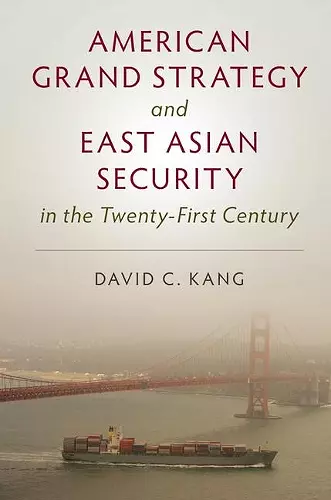American Grand Strategy and East Asian Security in the Twenty-First Century
Format:Paperback
Publisher:Cambridge University Press
Published:26th Oct '17
Currently unavailable, and unfortunately no date known when it will be back
This paperback is available in another edition too:
- Hardback£75.00(9781107167230)

David C. Kang tells an often overlooked story about East Asia's 'comprehensive security', arguing that American policy towards Asia should be based on economic and diplomatic initiatives rather than military strength.
David C. Kang argues that East Asia is more stable and peaceful than often recognized. He suggests that American policy should therefore emphasize diplomatic and economic relations with the region, rather than military-first policies. Will interest students and scholars of international relations, East Asian politics, China, Japan, and security studies.East Asia is richer, more integrated and more stable than ever before, whilst East Asian defense spending is now roughly half of what it was in 1990 and shows no sign of increasing. There is no evidence of any Asian arms race. All countries in the region are seeking diplomatic, not military solutions with each other. Yet this East Asia reality still runs counter to a largely Western narrative that views China's rise as a threat and the region as increasingly unstable. In this important book, David C. Kang argues that American grand strategy should emphasize diplomatic and economic relations with the region, rather than military-first policies. Using longitudinal and comparative data, statistical analysis, and intensive research in selected East Asian countries, he suggests that East Asia is in sync with the American desire to share burdens and that the region may in fact be more stable than popularly believed.
'Balance-of-power theory should predict that the countries of Asia are balancing the rise of China. As David C. Kang argues in this terrific contrarian book, there is only one problem: it is is not true. Kang argues for a picture of the Asia-Pacific that is much more hopeful, with strong prospects for continued peace and prosperity. But Kang's analysis comes with one important qualification: that the United States does not over-reach. Refreshing both for its analysis and for its much-needed policy conclusions.' Stephen Haggard, University of California, San Diego
'Provocative and innovative as always, David C. Kang has added another important book to his impressive list of contributions to the study of East Asian security. By matching insights from bargaining theory to trends in regional security policies and military outlays, Kang offers a novel rethinking of the effects of American grand strategy in the region. Particularly at a fraught moment in US diplomacy and security policy, this is a vital intervention in the scholarly and policy debates.' David Leheny, Henry Wendt III, '55 Professor of East Asian Studies, Princeton University, New Jersey
'… this book should be considered required reading for anyone who is interested in East Asian international relations, the rise of China, and U.S foreign policy. It will undoubtedly be read, debated, and discussed for many years to come.' Nicholas D. Anderson, Political Science Quarterly
ISBN: 9781316616406
Dimensions: 227mm x 151mm x 18mm
Weight: 350g
224 pages